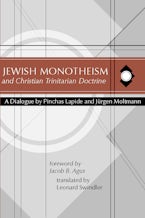Thinking beyond the absolutes Christians and other religious persons increasingly find "deabsolutized" in our modern thought world, Swidler reflects on the ways we humans think about the world and its meaning now that increasingly we notice that there are other ways of understanding the world than the way we grew up in. In this new situation we need to develop a common language we can use together both to appreciate our neighbors and enrich ourselves, what the author calls Ecumenical Esperanto, because it should serve as a common language without replacing any of the living languages of our religious and ideological traditions. Of course, such thinking anew about the world and its meaning must necessarily mean thinking anew about all of our religious beliefs--but this time, in dialogue.
Leonard Swidler is Professor of Catholic Thought and Interreligious Dialogue at Temple University (1966-) and founding editor (with Arlene Anderson Swidler, d. 2008) of the Journal of Ecumenical Studies, as well as founding president of the Dialogue Institute. His numerous publications include The Ecumenical Vanguard (1965), The Study of Religion in an Age of Global Dialogue (with Paul Mojzes, 2000), Confucianism in Dialogue Today (coedited with Shuxian Liu and John H. Berthrong, 2004), Jesus Was a Feminist (2007), Trialogue (with Khalid Duran and Reuven Firestone, 2007), and Dialogue for Interreligious Understanding (2014).
"In a world where we now have such terms as 'nones' and 'dual belongings,' where surveys have shown a seemingly paradoxical decrease in congregation numbers but a rise in spirituality, Professor Swidler brings his years of experience and scholarship in Religion studies to enlighten us. This book ought to be essential reading for both the religion scholar and the interested layperson."
--Khaleel Mohammed, Professor, Department of Religious Studies, San Diego State University
"Long before September 11, 2001, Leonard Swidler was teaching, writing, and advocating for global interreligious dialogue. Long before there was a profession known as 'interfaith educator/activist,' Leonard Swidler was doing the pioneering work that helped to create a space for such a career choice. Today, anyone interested in pursuing the work of multifaith engagement should start by reading this book!"
--Nancy Fuchs Kreimer, Reconstructionist Rabbinical College





